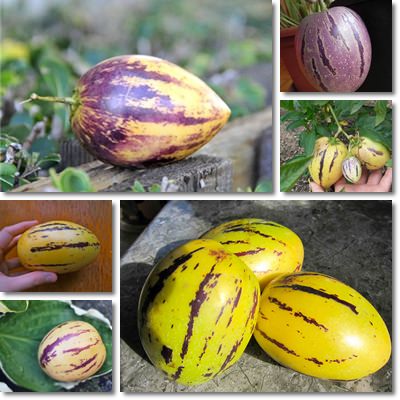Related to potatoes, tomatoes, eggplants, bell peppers and chili peppers, pepino (Solanum muricatum) is a sweet, melon-like fruit and a great source of essential nutrients, dietary fiber and antioxidants. Pepino is a fruit in the potato family, also known as Solanaceae. Common names include pepino melon, pepino dulce and melon pear and characterize the fruit’s sweet, melon-like taste with delicate pear flavors.
What does pepino look like?
The pepino plant looks a lot like a tomato plant with visibly more elongates, pointy leaves. Pepino melons are small, oval-shaped and about the size of an apple or an orange. They have a thin, light golden skin with elongated purple stripes. The soft flesh is a light golden yellow color and has a two-chamber, partly hollow middle area that houses tiny, light-golden seeds. Unripe pepino melons are light green with purple stripes and look like miniature watermelons or unripe tomatoes.

What does pepino melon taste like?
Pepino tastes a lot like a not-so-sweet cantaloupe with faint cucumber, pear or banana flavors. In fact, it is only mildly sweet and, if not perfectly ripe, may even seem bland. The pulp has a soft, cucumber and melon-like texture and can be easily scooped out with a spoon. Despite being growing upright, the plant may have to be erected on metal or wooden poles or left to vine over other plants when it fruits abundantly to avoid the fruit touching the ground and spoiling.
What does pepino smell like?
Ripe pepino has a mild honeydew melon fragrance that can almost pass unnoticed to an untrained nose. While they may not be as fragrant and sweet as other exotic fruit, pepino melons are quite thirst-quenching and surprisingly healthy.
What is pepino good for?
Here are the best 6 nutrition facts and health benefits of pepino:
Good source of vitamins and minerals
Pepino contains good amounts of vitamins C, K and A as well as provitamin A in the form of the antioxidant carotenoid beta-carotene. In addition to important antimicrobial, antiviral, anti-inflammatory and anticancer properties, these nutrients keep blood vessels clean of cholesterol plaques, maintain the elasticity and youthful appearance of our skin by supporting collagen production and protect against oxidative stress and cell damage.

Moreover, pepino melon contains good amounts of essential minerals such as calcium, copper, iron, magnesium, manganese and potassium, all of which further contribute to promoting good health. Calcium and magnesium contribute to good bone density, copper, manganese and iron offer antioxidant benefits.
Boosts immunity
Eating pepino may have benefits for immunity as a result of its content of vitamins A, C and beta-carotene. Vitamin C strengthens the immune system and reduces inflammation, protecting against disease and infection. Beta-carotene is turned into vitamin A which is known for its immune-boosting properties, maintaining the health of mucous membranes at the level of the nose, mouth, throat, lungs and digestive tract.
Better digestion, relieves constipation
The dietary fiber in pepino melon helps our digestive system function better. The pulp of the fruit is easy on the stomach and does not weight down digestion. The dietary fiber further helps shorten intestinal transit time, leading to more regular and easy bowel movements and helps prevent constipation and hemorrhoids.
Benefits for blood sugar and cholesterol
Pepino melons are good sources of dietary fiber which helps control blood sugar. Fiber is essentially indigestible plant material and because the stomach does not digest it, it does not absorb it either so fiber does not raise blood sugar levels. However, the natural sugars in pepino might if you eat too much and already have high blood sugar. As for its effects on cholesterol levels, fiber sticks to fats in the intestinal tract and prevents their absorption to a certain extent which indirectly contributes to lower LDL (bad) cholesterol levels.
Stomach benefits
Pepino is easy on the stomach, digested well and does not irritate the stomach lining or upset digestion in any way. On the contrary, because it does not contain either citric acid like citrus fruit or malic acid like apples, it does not cause acid reflux and is a safe food to eat in moderation if you have stomach problems.
Rich in antioxidant phytochemicals
Like most fruits and vegetables, pepino melons are a rich source of phytochemicals, natural chemical compounds found in all plant forms. Phytochemicals in general possess quite amazing antimicrobial, antithrombotic, antioxidant and anticancer properties.
The antioxidants in pepino have been found to boost the immune system, regulate blood pressure, raise HDL (good) cholesterol levels and potentially discourage the formation of blood clots. Moreover, they appear to exert a powerful anti-inflammatory action and help reverse cell and DNA damage caused by oxidative stress, with long term benefits on health.
Conclusion
If you happen to come across pepino melons in the supermarket and they have a reasonable price, try them. They are worth a taste, not to mention they are healthier than the processed foods, baked goods and sugary candy found everywhere. If scooping it out with a spoon and eating it as it is sounds too dull, you can imagine wonderful pepino recipes such as pepino, kiwifruit and pears salad seasoned with lime and a bit of brown sugar or honey, if you are not allergic to bee products.
